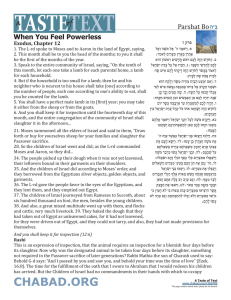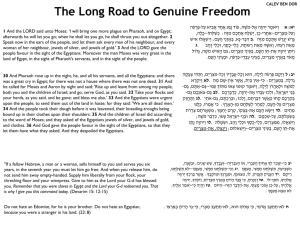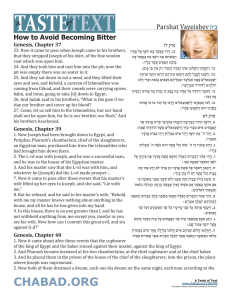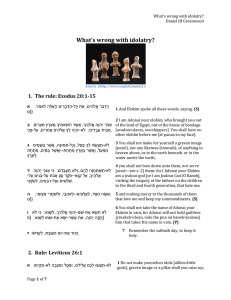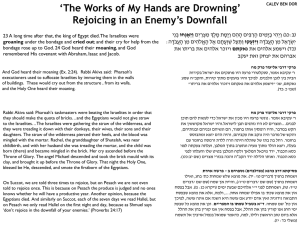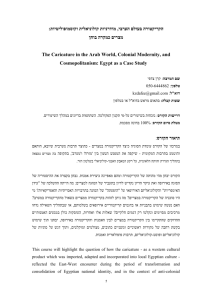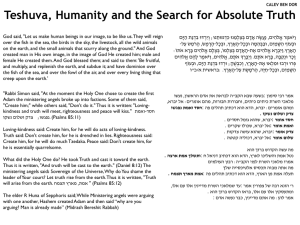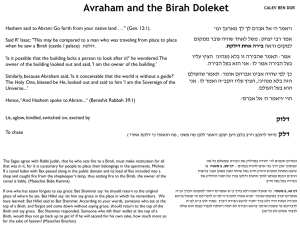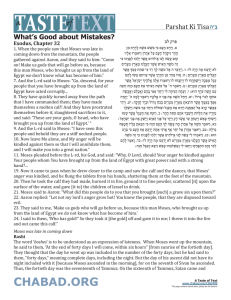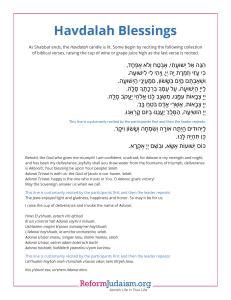Haggadah 2015 I. The Order of the Seder
advertisement
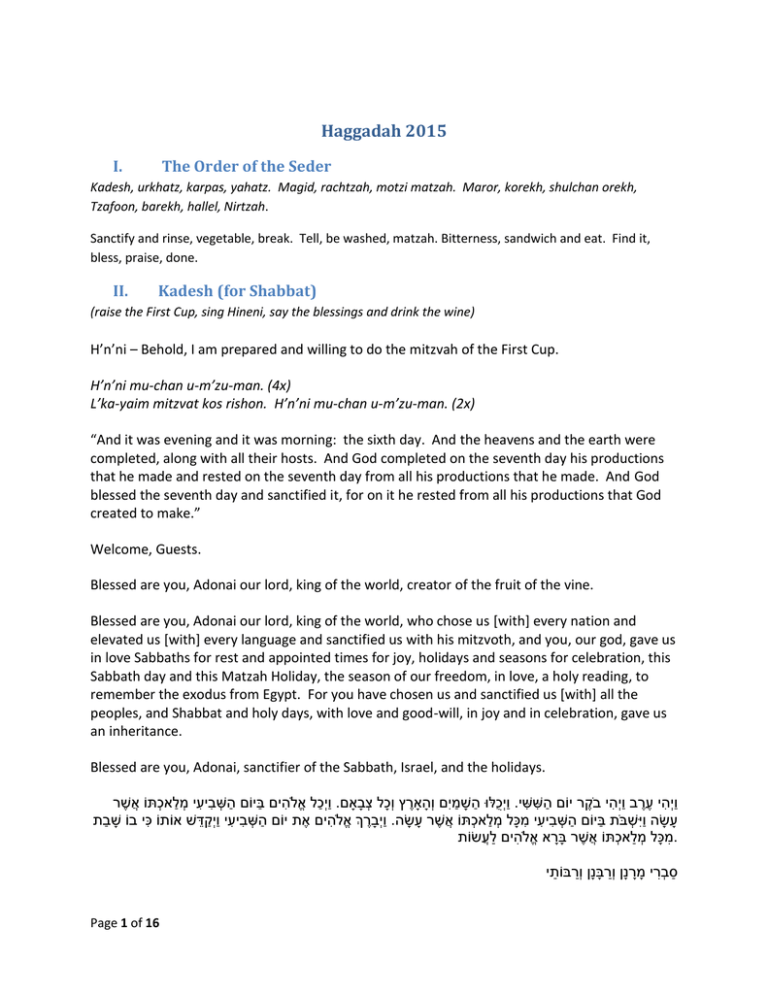
Haggadah 2015 I. The Order of the Seder Kadesh, urkhatz, karpas, yahatz. Magid, rachtzah, motzi matzah. Maror, korekh, shulchan orekh, Tzafoon, barekh, hallel, Nirtzah. Sanctify and rinse, vegetable, break. Tell, be washed, matzah. Bitterness, sandwich and eat. Find it, bless, praise, done. II. Kadesh (for Shabbat) (raise the First Cup, sing Hineni, say the blessings and drink the wine) H’n’ni – Behold, I am prepared and willing to do the mitzvah of the First Cup. H’n’ni mu-chan u-m’zu-man. (4x) L’ka-yaim mitzvat kos rishon. H’n’ni mu-chan u-m’zu-man. (2x) “And it was evening and it was morning: the sixth day. And the heavens and the earth were completed, along with all their hosts. And God completed on the seventh day his productions that he made and rested on the seventh day from all his productions that he made. And God blessed the seventh day and sanctified it, for on it he rested from all his productions that God created to make.” Welcome, Guests. Blessed are you, Adonai our lord, king of the world, creator of the fruit of the vine. Blessed are you, Adonai our lord, king of the world, who chose us [with] every nation and elevated us [with] every language and sanctified us with his mitzvoth, and you, our god, gave us in love Sabbaths for rest and appointed times for joy, holidays and seasons for celebration, this Sabbath day and this Matzah Holiday, the season of our freedom, in love, a holy reading, to remember the exodus from Egypt. For you have chosen us and sanctified us [with] all the peoples, and Shabbat and holy days, with love and good-will, in joy and in celebration, gave us an inheritance. Blessed are you, Adonai, sanctifier of the Sabbath, Israel, and the holidays. וַיְכַל אֱ ֹלהִ ים בַיֹום הַ שְ בִיעִ י מְ לַאכְּתֹו אֲ שֶ ר.ָארץ וְכָׁל ְצבָָׁאם ֶ ָׁ וַיְכֻּלּו הַ שָׁ מַ י ִם ו ְה.וַי ְהִ י עֶ ֶרב וַי ְהִ י ב ֹקֶ ר יֹום הַ שִ שִ י וַיְב ֶָׁרְך אֱ ֹלהִ ים אֶ ת יֹום הַ שְ בִיעִ י וַי ְקַ דֵּ ש אֹותֹו כִי בֹו שָׁ בַת.עָׁ שָׁ ה וַיִשְ ב ֹת בַיֹום הַ שְ בִיעִ י מִ כָׁל מְ לַאכְּתֹו אֲ שֶ ר עָׁ שָׁ ה מִ כָׁל מְ לַאכְּתֹו אֲ שֶ ר ב ָָׁׁרא אֱ ֹלהִ ים לַעֲ שֹות. ַ סַ ב ְִרי מָׁ ָׁרנָׁן ו ְַר ָׁבנָׁן ו ְַר בֹותי Page 1 of 16 ֵּ בָׁרּוְך אַ ָּׁתה יְי ָׁ אֱ ֹלהֵּ ינּו מֶ לְֶך הָׁ עֹולָׁם. בֹורא ְפ ִרי הַ גָׁפֶ ן ְֹותיו ָׁ אֲ שֶ ר בָׁחַ ר בָׁנּו עִ מִ כָׁל עָׁ ם ו ְרֹומְ מָׁ נּו עִ מִ כָׁל לָׁ שֹון ו ְקִ דְ שָׁ נּו בְמִ צ,בָׁרּוְך אַ ּתָׁ ה יְי ָׁ אֱ ֹלהֵּ ינּו מֶ לְֶך הָׁ עֹולָׁם. אֶ ת יֹום הַ שַ בָׁת הַ זֶה, חַ גִים ּוזְמַ נִים לְשָׁ שֹון,ו ַּתִ ֶּתן לָׁנּו יְי ָׁ אֱ ֹלהֵּ ינּו בְַאהֲ בָׁה שַ בָׁתֹות לִמְ נּוחָׁ ה ּומֹועֲ דִ ים לְשִ מְ חָׁ ה ְאֹותנּו ָׁ כִי בָׁנּו בָׁחַ ְרּתָׁ ו. זֵּכֶר לִיצִיַאת מִ צ ְָׁרי ִם, מִ קְ ָׁרא ק ֹדֶ ש, זְמַ ן חֵּ רּותֵּ נּו בְַאהֲ בָׁה,ו ְאֶ ת יֹום חַ ג הַ מַ ּצֹות הַ זֶה .ְּתנּו ָׁ בְשִ מְ חָׁ ה ּובְשָׁ שֹון הִ נְחַ ל, ו ְשַ בָׁת ּומֹועֲ דֵּ י קָׁ דְ שֶ ָך בְַאהֲ בָׁה ּוב ְָׁרצֹון,קִ דַ שְ ָּׁת עִ מִ כָׁל הָׁ עַ מִ ים . מְ קַ דֵּ ש הַ שַ בָׁת וְי ִשְ ָׁראֵּ ל ו ְהַ זְמַ נִים,ָׁ בָׁרּוְך אַ ָּׁתה יְי. Sh-hekhianu: Blessed are you, Adonai our lord, king of the world, who enlivens us and sustains us and brings us to this day שֶ הֶ חֱ י ָׁנּו ו ְקִ יְמָׁ נּו ו ְהִ גִיעָׁ נּו ַלזְמַ ן הַ זֶה,בָׁרּוְך אַ ּתָׁ ה יְי ָׁ אֱ ֹלהֵּ ינּו מֶ לְֶך הָׁ עֹולָׁם. III. Ur-khatz (‘wash’) (‘wash’ and remain silent until karpas) IV. Karpas (vegetable) (dip vegetables in salt water, bless, then eat) Blessed are you, Adonai our lord, king of the world, creator of the fruit of the earth. ֵּ ,בָׁרּוְך אַ ּתָׁ ה יְי ָׁ אֱ ֹלהֵּ ינּו מֶ לְֶך הָׁ עֹולָׁם. בֹורא ְפ ִרי הָׁ אֲ דָׁ מָׁ ה V. Yahatz (Break) (Break the middle matzah into two. The larger piece is the Afikomen – hide it for later. Return the smaller piece to the pile) VI. Magid (Tell!) A. The Bread of Affliction Ha Lachma Anya: This is the bread of poverty that our ancestors ate in the land of Mitzrayim. All who are oppressed, come and eat! All who are in need, come and share Passover. This year here – Next year in the land of Israel. This year, servers. Next year, liberated! Ha lach-ma an-ya. Dee-acha-lu av-ha-ta-na. B’ar-ah d’meetz ra-yeem. Kol deech-feen, yei-tei v’yei-chol. Kol dee-tzreech, yei-tei v’ yeef-sach. Ha-sha-ta ha-cha. L’sha-na ha-ba-ah be-ar-ah d’yis-ra-el. Ha sha-ta av-dei, l’sha-na ha-ba-ah, b’nei cho-reen. Page 2 of 16 .ְַארעָׁ א דְ מִ צ ְָׁרי ִם ְ הָׁ א לַחְ מָׁ א עַ נְי ָׁא דִ י אֲ כָׁלּו ַאבְהָׁ תָׁ נָׁא ב . ָׁכל דִ צ ְִריְך י ֵּיתֵּ י וְיִפְסַ ח,כָׁל דִ ְכ ִפין י ֵּיתֵּ י וְי ֵּיכ ֹל .ְַארעָׁ א דְ י ִשְ ָׁראֵּ ל ְ לְשָׁ נָׁה הַ בָָׁאה ב,הָׁ שַ ּתָׁ א הָׁ כָׁא ִ לְשָׁ נָׁה הַ בָָׁאה ְבנֵּי. הָׁ שַ ּתָׁ א עַ בְדֵּ י חֹורין May it be your will. As you took a people from the midst of a people, and passed your people Israel through the sea, so too – show compassion for our brethren, in Israel and the nations, who are trapped in sorrow and captivity, caught between sea and dry land. Rescue them and bring them out from narrowness to wide open, from shadows to light, and from shackles to freedom. Speedily and in our days, and we shall say, amen. B. The Four Questions How different this night is from all the other nights. On all other nights, we eat hametz and matzah. This night -- only matzah. On all other nights, we eat remaining vegetables. This night – bitter herbs. On all other nights, we don’t dip even once. This night – twice. On all other nights, we eat sitting or reclining. This night – we all recline. Ma nish-ta-na ha-lai-la ha-zeh mee-kol ha-lei-lot ? mee-kol ha-lei-lot ? -She-b’chol ha-lei-lot, anu och-leen cha-metz u-matza. cha-metz u-matza. Ha lai-la ha-zeh, Ha lai-la ha-zeh, ku-lo matza. Ha lai-la ha-zeh, Ha lai-la ha-zeh, ku-lo matza. -She-b’chol ha-lei-lot, anu och-leen sh’ar y’ra-kot, sh’ar y’ra-kot. Ha lai-la ha-zeh, Ha lai-la hazeh, maror, maror. Ha lai-la ha-zeh, Ha lai-la ha-zeh, maror, maror. -She-b’chol ha-lei-lot, ein anu mat-bee-leen afee-lu pa-am ehchat, afee-lu pa-am ehchat. Ha laila ha-zeh, Ha lai-la ha-zeh, shtei-f’ameem. Ha lai-la ha-zeh, Ha lai-la ha-zeh, shtei-f’ameem. -She-b’chol ha-lei-lot, anu och-leen bain yo-shveen u-vein m’su-been, bain yo-shveen u-vein m’su-been. Ha lai-la ha-zeh, Ha lai-la ha-zeh, ku-la-nu m’su-been. Ha lai-la ha-zeh, Ha lai-la hazeh, ku-la-nu m’su-been. מַ ה נִשְ ַּתנָׁה הַ ַּליְלָׁה הַ זֶה מִ כָׁל הַ ּלֵּילֹות- כֻּלֹו מַ ּצָׁה- הַ ַּליְלָׁה הַ זֶה,שֶ ְבכָׁל הַ ּלֵּילֹות ָאנּו אֹו ְכלִין חָׁ מֵּ ץ ּומַ ּצָׁה הַ ַּליְלָׁה הַ זֶה מָׁ רֹור- ,שֶ ְבכָׁל הַ ּלֵּילֹות ָאנּו אֹו ְכלִין שְ ָאר י ְָׁרקֹות הַ ַּליְלָׁה הַ זֶה שְ ֵּּתי ְפעָׁ מִ ים- ,שֶ ְבכָׁל הַ ּלֵּילֹות אֵּ ין ָאנּו מַ טְ בִילִין אֲ פִילּו פַ עַ ם אֶ חָׁ ת הַ ַּליְלָׁה הַ זֶה ֻכּלָׁנּו מְ סֻ בִין- ,שֶ ְבכָׁל הַ ּלֵּילֹות ָאנּו אֹו ְכלִין בֵּין יֹושְ בִין ּובֵּין מְ סֻ בִין Page 3 of 16 C. Avadim hayenu – first answer Slaves.1 We were slaves to Pharaoh in Egypt. And Adonai our God brought us out of there with a strong hand and an outstretched arm. And if the Holy One blessed-be-he had not brought our ancestors from Mitzrayim, we, and our children, and our children’s children, would be enslaved to Pharaoh in Egypt. So, even if all of us were learned, all of us wise, all of us elderly, all of us students of the Torah, we’d still be commanded to tell the story of the exodus from Egypt. And the more the story of the Exodus is told, the better. Ava-deem ha-yee-nu, ha-yee-nu. Ata b’nei choreen, b’nei choreen. Ava-deem ha-yee-nu. Ata, ata, b’nei choreen. Ava-deem ha-yee-nu. Ata, ata, b’nei choreen, b’nei choreen. Ata, ata, b’nei choreen, b’nei choreen. ו ְאִ ּלּו ֹלא הֹוצִיא הַ קָׁ דֹוש. ו ַיֹוצִיאֵּ נּו יְי ָׁ אֱ ֹלהֵּ ינּו מִ שָׁ ם ְבי ָׁד חֲ זָׁקָׁ ה ּו ִבזְרֹועַ נְטּוי ָׁה,עֲ בָׁדִ ים הָׁ י ִינּו לְפַ ְרע ֹה בְמִ צ ְָׁרי ִם ו ַאֲ פִ ילּו ֻכּלָׁנּו. הֲ ֵּרי ָאנּו ּו ָׁבנֵּינּו ּו ְבנֵּי ָׁבנֵּינּו מְ שֻ עְ בָׁדִ ים הָׁ י ִינּו לְפַ ְרע ֹה בְמִ צ ְָׁרי ִם,בָׁרּוְך הּוא אֶ ת אֲ בֹותֵּ ינּו מִ מִ צ ְָׁרי ִם ֻכּלָׁנּו נְבֹונִים,חֲ כָׁמִ ים, וְכָׁל הַ מַ ְרבֶה. מִ ְצו ָׁה עָׁ לֵּינּו לְסַ ֵּפר בִיצִיַאת מִ צ ְַרי ִם,ּתֹורה ָׁ ַ ֻכלָׁנּו יֹודְ עִ ים אֶ ת ה,ֻכלָׁנּו זְקֵּ נִים ְלסַ ֵּפר בִיצִיַאת מִ צ ְַרי ִם הֲ ֵּרי זֶה מְ שֻ בָׁח. D. Four Children Four times, the Torah tells us to tell the story of the exodus, as if to four children – one learned, one bad, one artless, and one who does not know enough to ask. The hakham, the scholar, what does she say? She quotes Deuteronomy 6:20: [“When your child asks you on the morrow,] ‘What mean the precepts, the laws and the regulations that Adonai our God commanded you?’” And you must guide her through all the laws of Pesah, until the last line of the Talmudic tractate on Pesach, “No eating dessert after the Pesah afikoman.” Commentaries: Since a “hakham” already knows the rules, she must be asking about the differences between these three kinds of commandments, and why they are distinguished even though each comes with the same authority. In contrast, perhaps she is contrasting the ritual law with the transcendent story of freedom behind them, asking about the relationship between religious practice and the more demanding calls of justice. More simply, perhaps the intent is that when a student is enthusiastic, the teacher ought to respond in kind. The rasha, the wicked, what does she say? She quotes Ex. 12:26, [“When your children say to you,] ‘What is this service to you?’” To you and not to her. Separating yourself from the community is “kofer b’ikar”: it violates the very core. So blunt her teeth – “It is because of what Adonai did for me, when I went out of Egypt.” (Ex. 13:8) For me and not for her. Had she been there, she would not have been redeemed. Commentaries: The Haggadah seems to be arguing against hyper-literal readings of Biblical texts or overemphasis on words (as opposed to their meanings). Both the hakham and the tam also say “to you,” 1 Ovadim (slaves, servants, workers, worshippers) Page 4 of 16 so there is not some magic quality to those words. Instead, the point is that one who separates from the community is no longer part of the community. If you are not part of the project, it goes on without you. Or, maybe the opposite: Words are enormously important. Sardonic, hurtful words lead to responses in kind. Or perhaps the intent is to set out the limits of permissible discussion: ask any questions or draw any conclusions you like, but don’t forget that we are in this together. But note that the rasha remains one of the four children and, indeed, part of the seder. Moreover, the rasha is directly quoting Exodus, which surely indicates a certain connection to the community! Even while claiming that the child has withdrawn from the community, the Haggadah/parent includes her in the discussion (and the community), pulling her back in – the parent is also saying that it isn’t so easy to cut ties as you might think. Finally, note that the Haggadah uses this same answer again for the one who does not know to ask, and then again before Hallel. Do the other contexts give more meaning to this one or vice versa? The tam, the innocent, naïve or artless one, what does he say? “What’s this?” Answer him, “By strength of hand, God brought us out of Egypt, from the house of slavery.” (Ex. 13:14) Commentaries: Even the simplest ask, “what is this?,” or “what does it mean?” – authority is never entitled to respect without question; customs should never be followed blindly. Chabad interprets the “strong hand” as meaning that God was able to overcome strict justice to end the slavery before the 400 years were up. For your simple or spiritual side, the details are unimportant – what matters is that slavery is bad, even when it is part of “God’s plan” or literary necessity to punish for the enslavement of the Egyptians. And the One-who-does-not know-to-ask. You open for him, as in Ex. 13:8: “You are to tell your child on that day, saying, ‘It is because of what Adonai did for me, when I went out of Egypt.’” Commentaries: Is the response hostile, as it was when the same verse was used to respond to the rasha? If so, why? Does the fourth child represent the ritually observant Jew who does not question authority? Or is it a rebuke to those who, unlike Abraham, do not say “Will the Judge of all the earth not do justice?” when they see power doing wrong? Or is the response not hostile at all, instead making the point that “to me” sometimes clearly means “to me and you and all creation” – suggesting that the fourth child is in perfect harmony with the spirit, needing no words and no questions to understand that “I am he as you are he as you are me and we are all together”? (See the explanation of this answer given before Hallel.) ו ְאֶ חָׁ ד שֶ אֵּ ינֹו יֹודֵּ עַ לִשְ אֹול, ו ְאֶ חָׁ ד ּתָׁ ם, ו ְאֶ חָׁ ד ָׁרשָׁ ע, אֶ חָׁ ד חָׁ כָׁם.ּתֹורה ָׁ ַארבָׁעָׁ ה ָׁבנִים דִ ב ְָׁרה ְ ְכנֶגֶד. :חָׁ כָׁם מָׁ ה הּוא אֹומֵּ ר? מַ ה הָׁ עֵּ דֹות ו ְהַ חֻ קִ ים ו ְהַ מִ שְ פָׁטִ ים אֲ שֶ ר ִצּוָׁה יְי ָׁ אֱ ֹלהֵּ ינּו אֶ תְ כֶם? ו ְַאף אַ ּתָׁ ה אֱ מָׁ ר לֹו כְהִ לְכֹות הַ פֶ סַ ח ִ ִאֵּ ין מַ פְ ט. ירין ַאחַ ר הַ פֶ סַ ח אֲ פִ יקֹומָׁ ן Page 5 of 16 ו ְַאף אַ ּתָׁ ה. ּו ְל ִפי שֶ הֹוצִיא אֶ ת עַ צְמֹו מִ ן הַ ְכלָׁל כָׁפַר בְעִ קָׁ ר. ו ְֹלא לֹו- ָׁרשָׁ ע מָׁ ה הּוא אֹומֵּ ר? מָׁ ה הָׁ עֲב ֹדָׁ ה הַ ז ֹאת ָׁלכֶם? ָׁלכֶם ֹלא הָׁ י ָׁה נִגְָאל, אִ יּלּו הָׁ י ָׁה שָׁ ם. ו ְֹלא לֹו- לִי. בַעֲבּור זֶה עָׁ שָׁ ה יְי ָׁ לִי ְבצֵּאתִ י מִ מִ צ ְָׁרי ִם:הַ קְ הֵּ ה אֶ ת שִ נָׁיו ו ֶאֱ מ ֹר לֹו. מִ בֵּית עֲ בָׁדִ ים, בְחֹזֶק י ָׁד הֹוצִיָאנּו יְי ָׁ מִ מִ צ ְָׁרי ִם:ּתָׁ ם מָׁ ה הּוא אֹומֵּ ר? מַ ה ז ֹאת? ו ְָאמַ ְרּתָׁ אֵּ לָׁיו. בַעֲ בּור זֶה עָׁ שָׁ ה יְי ָׁ לִי ְבצֵּאתִ י מִ מִ צ ְָׁרי ִם, ו ְהִ גַדְ ּתָׁ ְל ִבנְָך בַיֹום הַ הּוא לֵּאמ ֹר: שֶ נֶאֱ מַ ר, אַ ּתְ פְ תַ ח לֹו- ו ְשֶ אֵּ ינֹו יֹודֵּ עַ לִשְ אֹול. E. Idol Worshippers (slaves to strange service): History I , ו ְעַ כְשָׁ יו קֵּ ְר ָׁבנּו הַ מָׁ קֹום לַעֲ ב ֹדָׁ תֹו,מִ ּתְ חִ ּלָׁה עֹובְדֵּ י עֲ בֹודָׁ ה ז ָָׁׁרה הָׁ יּו אֲ בֹותֵּ ינּו : כ ֹה ָאמַ ר יְי ָׁ אֱ ֹלהֵּ י י ִשְ ָׁראֵּ ל, ו ַי ֹאמֶ ר י ְהֹושֻ עַ אֶ ל כָׁל הָׁ עָׁ ם:שֶ נֶאֱ מַ ר , ֶּת ַרח אֲ בִי ַאב ְָׁרהָׁ ם ו ַאֲ בִי נָׁחֹור,בְעֵּ בֶר הַ נָׁהָׁ ר י ָׁשְ בּו אֲ בֹותֵּ יכֶם מֵּ עֹולָׁם .וַיַעַ בְדּו אֱ ֹלהִ ים אֲ חֵּ ִרים ,ו ָׁאֶ קַ ח אֶ ת אֲ בִיכֶם אֶ ת ַאב ְָׁרהָׁ ם מֵּ עֵּ בֶר הַ נָׁהָׁ ר ו ָׁאֹולְֵּך אֹותֹו ְבכָׁל אֶ ֶרץ ְכנָׁעַ ן , ו ָׁאֶ ּתֵּ ן לְעֵּ שָׁ ו אֶ ת הַ ר שֵּ עִ יר ל ֶָׁרשֶ ת א ֹתֹו. ו ָׁאֶ ּתֵּ ן ְליִצְחָׁ ק אֶ ת י ַעֲ ק ֹב ו ְאֶ ת עֵּ שָׁ ו,ַָׁארבֶה אֶ ת ז ְַרעֹו וָׁאֶ ּתֵּ ן לֹו אֶ ת יִצְחָׁ ק ְ ו וְי ַעֲ ק ֹב ּו ָׁבנָׁיו י ְָׁרדּו מִ צ ְָׁרי ִם. In the beginning, our ancestors were servants2 of a strange service3, and now the Place (Makom) has neared us to his service. As it is said, “And Joshua said to all the people, thus says the lord God of Israel: Your ancestors settled beyond4 the River, from time immemorial. Terah, father of Abraham and father of Nahor. And they served other gods. And I took your ancestor, Abraham, from beyond the River and walked him all over the land of Canaan. And I enlarged his seed and gave him Isaac, and I gave to Isaac Jacob and Esau. And I gave to Esau Har Se’ir to inherit it. And Jacob and his children went down to Egypt.” . בָׁרּוְך הּוא,בָׁרּוְך שֹומֵּ ר הַ בְטָׁ חָׁ תֹו ְלי ִשְ ָׁראֵּ ל ,ְת ִרים ָׁ לַעֲ שֹות כְמַ ה שֶ ָאמַ ר לְַאב ְָׁרהָׁ ם ָאבִינּו ִבב ְִרית בֵּין הַ ב,שֶ הַ קָׁ דֹוש בָׁרּוְך הּוא חִ שַ ב אֶ ת הַ קֵּ ץ , י ָׁד ֹע ּתֵּ דַ ע כִי גֵּר י ִהְ י ֶה ז ְַרעֲ ָך בְאֶ ֶרץ ֹלא לָׁהֶ ם, ו ַי ֹאמֶ ר לְַאב ְָׁרם:שֶ נֶאֱ מַ ר .ַארבַע מֵּ אֹות שָׁ נָׁה ְ ו ַעֲ בָׁדּום ו ְעִ נּו א ֹתָׁ ם וְגַם אֶ ת הַ גֹוי אֲ שֶ ר י ַעֲ ב ֹדּו דָׁ ן ָאנֹכִי ו ְַאחֲ ֵּרי כֵּן יֵּצְאּו ב ְִרכֻש גָׁדֹול Blessed is the One who keeps his promises to Israel. For the Holy One blessed-be-he calculated the end, to do as he said to Abraham our ancestor at the Brit of Betarim. As it is said, “And he said to Avram, Know, surely know, that your seed shall be foreigners ( )גֵּרliving in a land not their own, and they shall enslave5 them and oppress them 400 years. And the nation that enslaves I will judge, and after that, they shall go out with great wealth.” F. V’He sh’ amda (That which that stood up) (Cover the matzah and lift the glass of wine while saying this paragraph) 2 Ovdai: i.e., slaves, worshippers, servants, workers. Avodah zarah: Literally, foreign work, i.e., idol worship. 4 Evar (beyond, crossed-over): This is the (folk?) etymology of Hebrew (Beyonders) – those from beyond the River (Euphrates). 5 Same root as worshipper, slave, servant, worker (see above). 3 Page 6 of 16 And this stood up for our ancestors and us – that not one alone stood against us to destroy us, but in every generation they stand against us to destroy us, and the Holy One blessed-be-he rescues us from their hand. V’hee sh’am-da, v’hee sh’am-da, la-avot-ei-nu v’la-nu (2x) Sh’lo eh-chad beel-vad, amad alei-nu l’cha-lo-tei-nu Eh-al sh’b’chol dor va-dor, om-deem a-lei-nu l’cha-lo-tei-nu, V’ha-ka-dosh ba-ruch hu ma-tzee-lei-nu mee-yad-am !ו ְהִ יא שֶ עָׁ מְ דָׁ ה לַאֲ בֹותֵּ ינּו וְלָׁנּו ֵַּּלֹות ,שֶ ֹּלא אֶ חָׁ ד ִב ְלבָׁד עָׁ מַ ד עָׁ לֵּינּו ְלכ נּו ,אֶ ּלָׁא שֶ ְבכָׁל דֹור ו ָׁדֹור עֹומְ דִ ים עָׁ לֵּינּו ְלכַּלֹותֵּ נּו ו ְהַ קָׁ דֹוש בָׁרּוְך הּוא מַ ּצִילֵּנּו מִ יָׁדָׁ ם. G. Arami Oved (a wandering Aramaean): History II A wandering (or lost) Aramaean was my father. And he went down to Egypt, and sojourned there in tiny numbers. And there became a great nation, weighty and many. Then the Egyptians did us evil and oppressed us, and gave us to hard work/service. We cried out to the Lord, god of our ancestors, and the Lord heard our voices, and saw our misery and our toil and our pressure. And the Lord took us out of Egypt, with a strong hand and an outstretched arm and with great awe and signs and wonders. עָׁ צּום ו ָָׁׁרב, וַי ְהִ י שָׁ ם לְגֹוי גָׁדֹול, וַי ֵֶּרד מִ צ ְַרי ְמָׁ ה וַיָׁגָׁר שָׁ ם בִמְ תֵּ י מְ עָׁ ט,אֲ ַרמִ י אֹבֵּד ָאבִי . וַי ְִּתנּו עָׁ לֵּינּו עֲ ב ֹדָׁ ה קָׁ שָׁ ה,וַי ֵָּׁרעּו א ֹתָׁ נּו הַ מִ צ ְִרים וַי ְעַ נּונּו וַי ְַרא אֶ ת עָׁ נְי ֵּנּו ו ְאֶ ת עֲ מָׁ לֵּנּו ו ְאֶ ת לַחֲ צֵּנּו, וַיִשְ מַ ע יְי ָׁ אֶ ת קֹלֵּנּו,וַנִצְעַ ק אֶ ל יְי ָׁ אֱ ֹלהֵּ י אֲ ב ֹתֵּ ינּו. ּובְא ֹתֹות ּובְמ ֹפְתִ ים, ּובְמ ָֹׁרא גָׁד ֹל,ו ַיֹוצִאֵּ נּו יְי ָׁ מִ מִ צ ְַרי ִם ְבי ָׁד חֲ זָׁקָׁ ה ּו ִבזְר ֹעַ נְטּוי ָׁה H. Drash of Arami Oved (At this point, the Haggadah tells rest of the Exodus story by explicating each word of the Arami Oved passage. Since the explication is difficult to follow in translation, this year we’ve decided to omit it and, instead, to focus on one aspect of the story: the repeated use of the word oved/avodah (worshipper, slave, worker, servant/worship, service, slavery, work), the parallels it draws (and resists) between slavery to God and slavery to man, and its polemic against inequality and hierarchy – and the battle over whether to accept this message. The drash begins by radically reinterpreting the first line of our passage – My father was a wandering Aramaen – reading it, instead, as “An Aramaen (wanted to) destroy my father.” Linguistically, the first reading is the easier one – but it sends a difficult message: do not imagine that you have some inherited superiority; you are not descended from royalty (or the chosen) but from a homeless Iraqi, not to mention slaves and idol worshippers. (Genesis, of course, makes the point stronger: actually, no one has any claim to inherited superiority, for we are all descendants of the same Adam, who was made from dust (adama) and, in the eyes of God, might as well have taken any animal as his partner.) The second reading, in contrast, emphasizes the message of V’he sh’amda: they are out to get us. From the beginning, we’ve been surrounded by enemies, but God rescues us. Or, in the modern version, we should get them first. Page 7 of 16 Genesis tells the story of the descent into Egypt as a novella about Joseph and his family, the “small numbers,” that became great and frightened the Egyptians into enslaving them lest they rise up against their host. But within that story, it tells another story of enslavement, and that is what we are going to read tonight. Gen 41:44 (Fox translation) Pharaoh said to Yosef: I am Pharaoh, but without you, no man shall raise hand or foot in all the land of Egypt. Pharaoh called Yosef’s name: Tzafenet Pane’ah (i.e., The God Speaks and He Lives). He gave him Asenat, daughter of Potipera, priest of On, as a wife. And Yosef’s influence went out over all the land of Egypt. Now Yosef was thirty years old when he stood in the presence of Pharaoh, king of Egypt. Yosef went out from Pharaoh’s presence and passed through all the land of Egypt. In the seven years of abundance, the land produced in handfuls. And he collected all kinds of provisions from those seven years in the land of Egypt, and placed the provisions in the towns. The provisions from the fields of a town, surrounding it, he placed in it. So Yosef piled up grain like the sand of the sea, exceedingly much, until they had to stop counting, for it was uncountable. … There came an end to the seven years of abundance that had occurred in the land of Egypt, and there started to come the seven years of famine, as Yosef had said. Famine happened in all the lands, in the all the land of Egypt there was bread. But when all the land of Egypt felt the famine, and the people cried out to Pharaoh for bread, Pharaoh said to all the Egyptians: Go to Yosef, whatever he says to you, do! Now the famine was over all the surface of the earth. Yosef opened up all the storehouses in which there was grain and gave out rations to the Egyptians, since the famine was becoming stronger in the land of Egypt. … Page 8 of 16 Genesis 47: 13 But bread there was none in all the land, for the famine was exceedingly heavy, and the land of Egypt and the land of Canaan were exhausted by the famine. Yosef had collected all the silver that was to be found in the land of Egypt and in the land of Canaan, from the rations that they had bought, and Yosef had brought the silver into Pharaoh’s house. When the silver in the land of Egypt and in the land of Canaan had run out, all the Egyptians came to Yosef, saying, Come-now – let us have bread! Why should we die in front of you because the silver is gone? Yosef said, Come-now, let me have your livestock and I will give you bread for your livestock, since the silver is gone. So they brought their livestock to Yosef and Yosef gave them bread for the horses, the sheep, the oxen and the donkeys, he got-them-through with bread, for all their livestock in that year. But when that year had run out, they came back to him in the second year and said to him: We cannot hide from my lord that if the silver has run out and the animal-stocks are my lord’s, nothing remains for my lord except our bodies and our soil! Why should we die before your eyes, so we, so our soil? Acquire us and our soil for bread, and we and our soil will become slaves to Pharaoh. Give us seed for sowing that we may live and not die, and the soil may not become desolate! So Yosef acquired all the soil of Egypt for Pharaoh – for each of the Egyptians sold his field, for the famine was strong upon them – and the land went over to Pharaoh. As for the people, he transferred them into the cities, from one edge of Egypt’s border to its other edge. … Yosef said to the people: Now that I have acquired you and your soil today for Pharaoh, here you have seed, sow the soil. But it shall be at the in-gatherings, that you shall give a fifth to Pharaoh, the four other parts being for you as seed for the field and for your eating, for those in your households and for feeding your Page 9 of 16 little ones. They said: You have saved our lives! May we find favor in my lord’s eyes. We will become slaves to Pharaoh. So why is this origin myth inserted into ours? Is the author’s view that the Jews became slaves to the Egyptians because the Jew enslaved the Egyptians? Is Joseph the model of a court Jew, promoting his master’s interest and unfairly maligned for it – or is the story contending that he invented serfdom and is the model of how Jews should not act? When the Haggadah insists that the Jews were enslaved because of God’s promise to Avram – is that an attempt to avoid this lesson? Or is this the fulfillment of the promise—a lesson that Pharaoh is not God, that Yosef had no business “serving” (worshipping?) him, and no human has the right to demand service from others? I. Plagues and Exodus And the Lord brought us out of Egypt. Not by an angel and not by a Seref, and not by a messenger, but the Holy One Blessed Be He in his honor and himself. As it is said, “And I will cross over6 the land of Egypt on this night, and I will strike each first born in the land of Egypt from man to beast, and I will pass judgment on all the gods of Egypt. I am the Lord.” I and not an angel; I and not a messenger. ו ְאֵּ ּלּו הֵּ ן,אֵּ ּלּו עֶ שֶ ר מַ כֹות שֶ הֵּ בִיא הַ קָׁ דֹוש בָׁרּוְך הּוא עַ ל הַ מִ צ ְִרים בְמִ צ ְַרי ִם: מַ כַת בְכֹורֹות, ח ֹשֶ ְך,ַארבֶה ְ , ב ָָׁׁרד, שְ חִ ין, דֶ בֶר, עָׁ רֹוב, ִכנִים, ַ צְפַ ְרדֵּ ע,דָׁ ם. These are the ten plagues that the Holy One brought upon the Egyptians in Egypt. Dam, Tzfardeh, kinim, arov, dever, shekhin, barad, arbeh, hoshekh, makat b’khorot. Blood, frogs, lice, beasts, plague, boils, hail, locusts, darkness, blow to the firstborn. … J. Dayenu Ee-lu ho-tzee ho-tzee-anu ho-tzee-anu mee-meetz-ra-yeem, ho-tzee-anu mee-meetz-ra-yeem, DAYEINU. Ee-lu he-eh-chee la-nu et ha-mahn, v’lo na-tan la-nu et ha-Shabbat, DA-YEINU !כַמָׁ ה מַ עֲ לֹות טֹובֹות לַמָׁ קֹום עָׁ לֵּינּו דַ יֵּינּו,אִ ּלּו הֹוצִיָאנּו מִ מִ צ ְַרי ִם ו ְֹלא עָׁ שָׁ ה בָׁהֶ ם שְ פָׁ טִ ים. דַ יֵּינּו, ו ְֹלא עָׁ שָׁ ה בֵּאֹלהֵּ יהֶ ם,אִ ּלּו עָׁ שָׁ ה בָׁהֶ ם שְ פָׁ טִ ים. ֵּ ו ְֹלא הָׁ ַרג אֶ ת ב,אִ ּלּו עָׁ שָׁ ה בֵּאֹלהֵּ יהֶ ם. דַ יֵּינּו,ְכֹוריהֶ ם 6 Cross over= avar. Same root as “Hebrew.” Page 10 of 16 .אִ ּלּו הָׁ ַרג אֶ ת ב ֵּ ְכֹוריהֶ ם ו ְֹלא נָׁתַ ן לָׁנּו אֶ ת מָׁ מֹונָׁם ,דַ יֵּינּו .אִ ּלּו נ ַָׁתן לָׁנּו אֶ ת מָׁ מֹונָׁם ו ְֹלא קָׁ ַרע לָׁנּו אֶ ת הַ יָׁם ,דַ יֵּינּו ִירנּו בְתֹוכֹו בֶחָׁ ָׁרבָׁה ,דַ יֵּינּו .אִ ּלּו קָׁ ַרע לָׁנּו אֶ ת הַ יָׁם ו ְֹלא הֶ עֱ ב ָׁ ִירנּו בְתֹוכֹו בֶחָׁ ָׁרבָׁה ו ְֹלא שִ קַ ע צ ֵָּׁרנּו בְתֹוכֹו ,דַ יֵּינּו .אִ ּלּו הֶ עֱ ב ָׁ ַארבָׁעִ ים שָׁ נָׁה ,דַ יֵּינּו .אִ ּלּו שִ קַ ע צ ֵָּׁרנּו בְתֹוכֹו ו ְֹלא סִ פֵּק צ ְָׁרכֵּנּו בַמִ דְ בָׁר ְ ַארבָׁעִ ים שָׁ נָׁה וֹלא הֶ אֱ כִילָׁנּו אֶ ת הַ מָׁ ן ,דַ יֵּינּו .אִ ּלּו סִ פֵּק צ ְָׁרכֵּנּו בַמִ דְ בָׁר ְ .אִ ּלּו הֶ אֱ כִילָׁנּו אֶ ת הַ מָׁ ן ו ְֹלא נָׁתַ ן לָׁנּו אֶ ת הַ שַ בָׁת ,דַ יֵּינּו .אִ ּלּו נ ַָׁתן לָׁנּו אֶ ת הַ שַ בָׁת ,ו ְֹלא קֵּ ְרבָׁנּו ִל ְפנֵּי הַ ר סִ ינַי ,דַ יֵּינּו ּתֹורה ,דַ יֵּינּו .אִ ּלּו קֵּ ְרבָׁנּו לִפְ נֵּי הַ ר סִ ינַי ,ו ְֹלא נ ַָׁתן לָׁנּו אֶ ת הַ ָׁ ּתֹורה ו ְֹלא הִ ְכנִיסָׁ נּו לְאֶ ֶרץ י ִשְ ָׁראֵּ ל ,דַ י ֵּינּו .אִ ּלּו נ ַָׁתן לָׁנּו אֶ ת הַ ָׁ ירה ,דַ יֵּינּו .אִ ּלּו הִ ְכנִיסָׁ נּו לְאֶ ֶרץ י ִשְ ָׁראֵּ ל ו ְֹלא ָׁבנָׁה לָׁנּו אֶ ת בֵּית הַ בְחִ ָׁ עַ ל ַאחַ ת ,כַמָׁ ה וְכַמָׁ ה ,טֹובָׁה כְפּולָׁה ּומְ כֻפֶ לֶת לַמָׁ קֹום עָׁ לֵּינּו :שֶ הֹוצִיָאנּו מִ מִ צ ְַרי ִם ,ו ְעָׁ שָׁ ה בָׁהֶ ם שְ פָׁ טִ ים ,ו ְעָׁ שָׁ ה בֵּאֹלהֵּ יהֶ ם ,ו ְהָׁ ַרג אֶ ת ב ֵּ ְכֹוריהֶ ם ,וְנָׁתַ ן לָׁנּו אֶ ת מָׁ מֹונָׁם ,ו ְקָׁ ַרע לָׁנּו אֶ ת הַ יָׁם ַארבָׁעִ ים שָׁ נָׁה ,ו ְהֶ אֱ כִילָׁנּו אֶ ת הַ מָׁ ן ,וְנ ַָׁתן ִירנּו בְתֹוכֹו בֶחָׁ ָׁרבָׁה ,ו ְשִ קַ ע צ ֵָּׁרנּו בְתֹוכֹו ,ו ְסִ פֵּק צ ְָׁרכֵּנּו בַמִ דְ בָׁר ְ ו ְהֶ עֱ ב ָׁ ּתֹורה ,ו ְהִ ְכנִיסָׁ נּו לְאֶ ֶרץ י ִשְ ָׁראֵּ לּ ,ו ָׁבנָׁה לָׁנּו אֶ ת בֵּית לָׁנּו אֶ ת הַ שַ בָׁת ,ו ְקֵּ ְרבָׁנּו ִל ְפנֵּי הַ ר סִ ינַי ,וְנ ַָׁתן לָׁנּו אֶ ת הַ ָׁ ירה ְל ַכ ֵּפר עַ ל כָׁל עֲ ֹונֹותֵּ ינּו .הַ בְחִ ָׁ K. Pesah, Matzah & Maror Rabban Gamliel would say: Whoever has not said these three things on Passover has not fulfilled the obligation – Pesah, Matzah, and Maror. ַרבָׁן גַמְ לִיאֵּ ל הָׁ י ָׁה אֹומֵּ ר :כָׁל שֶ ֹּלא ָאמַ ר שְ לשָׁ ה דְ ב ִָׁרים אֵּ ּלּו בַפֶ סַ חֹ ,לא יָׁצָׁא י ְדֵּ י חֹובָׁתֹו ,ו ְאֵּ ּלּו הֵּ ן :פֶ סַ ח ,מַ צָׁה, ּ.ומָׁ רֹור (lift the bone/beet) Pesach. This Pesach that our ancestors ate when the Temple still existedwhy? Because the Holy One blessed-be-he “passed over” their houses in Egypt. As it is said (Ex. 12:27): “then say, It is the slaughter-meal of Passover to the Lord, who passed over the houses of the house of Israel in Egypt, when he dealt the blow to Egypt and our houses he rescued. ”The people did homage and bowed low. פֶ סַ ח שֶ הָׁ יּו אֲ בֹותֵּ ינּו אֹו ְכלִים ִבזְמַ ן שֶ בֵּית הַ מִ קְ דָׁ ש הָׁ י ָׁה קַ יָׁם ,עַ ל שּום מָׁ ה? עַ ל שּום שֶ פָׁ סַ ח הַ קָׁ דֹוש בָׁרּוְך הּוא עַ ל בָּׁתֵּ י אֲ בֹותֵּ ינּו בְמִ צ ְַרי ִם ,שֶ נֶאֱ מַ ר :ו ַאֲ מַ ְר ֶּתם ֶזבַח פֶ סַ ח הּוא לַיי ,אֲ שֶ ר פָׁ סַ ח עַ ל בָּׁתֵּ י ְבנֵּי י ִשְ ָׁראֵּ ל בְמִ צ ְַרי ִם ְ .בנָׁגְפֹו אֶ ת מִ צ ְַרי ִם ,ו ְאֶ ת בָּׁתֵּ ינּו הִ ּצִיל ,וַיִק ֹד הָׁ עָׁ ם וַיִשְ ּתַ חֲ וּו (lift the matzah) Matzah. This Matzah that we eat – why? Because our ancestors’ dough did not have time to rise before the King of Kings, the Holy One blessed-be-he, was revealed to them and redeemed them. As it is said, (Ex. 12:39): “Now they baked the dough which they had brought out of Egypt into matzah cakes for it did not ferment, because they had been driven out of Egypt and were not able to linger; neither had they made provisions for ”themselves. Page 11 of 16 ֵּ ֲ עַ ל שּום מָׁ ה? עַ ל שּום שֶ ֹלא הִ סְ פִיק ְבצֵּקָׁ ם שֶ ל א,מַ ּצָׁה זֹו שֶ ָאנּו אֹו ְכלִים בֹותינּו לְהַ חֲ מִ יץ עַ ד שֶ נִ ְגלָׁה עֲ לֵּיהֶ ם , ו ַי ֹאפּו אֶ ת הַ ָׁבצֵּק אֲ שֶ ר הֹוצִיאּו מִ מִ צ ְַרי ִם עֻ ג ֹת מַ ּצֹות: שֶ נֶאֱ מַ ר, ּוגְָאלָׁם, הַ קָׁ דֹוש בָׁרּוְך הּוא,מֶ לְֶך מַ ְלכֵּי הַ מְ ָׁלכִים וְגַם צֵּדָׁ ה ֹלא עָׁ שו לָׁהֶ ם, ַ כִי ג ְֹרשּו מִ מִ צ ְַרי ִם ו ְֹלא יָׁכְלּו לְהִ תְ מַ הְ מֵּ ה,כִי ֹלא חָׁ מֵּ ץ. (lift the maror) Maror. This Maror (bitterness) that we eat – why? Because the Egyptians embittered the lives of our ancestors in Egypt, as it is said (Ex. 1:14): “They embittered their lives with harsh servitude in mortar and in bricks and in every kind of servitude7 in the field – all their service8 in which they enslaved9 them with crushing-labor.” ֵּ ֲ עַ ל שּום מָׁ ה? עַ ל שּום שֶ מֵּ ְררּו הַ מִ צ ְִרים אֶ ת חַ יֵּי א,מָׁ רֹור זֶה שֶ ָאנּו אֹו ְכלִים וַי ְמָׁ ֲררּו: שֶ נֶאֱ מַ ר,בֹותינּו בְמִ צ ְַרי ִם בְח ֹמֶ ר ּו ִב ְל ֵּבנִים ּו ְבכָׁל עֲ ב ֹדָׁ ה בַשָׁ דֶ ה אֶ ת כָׁל עֲ ב ֹדָׁ ָׁתם אֲ שֶ ר עָׁ בְדּו בָׁהֶ ם בְפָׁ ֶרְך,אֶ ת חַ יֵּיהֶ ם בַעֲ ב ֹדָׁ ה קָׁ שָׁ ה. L. Halleluyah In every generation, a human being10 must see himself as if he left Egypt, as it is said (Ex. 13:8), “And you are to tell your child on that day, saying, ‘It is because of what Adonai did for me, when I went out of Egypt.’” Not our ancestors alone did the Holy One blessed-be-he redeem, but He also redeemed us with them, as it is said (Deut. 6:23), “And he took us out of there in order to bring us, to give us the land that he swore to our ancestors.” B’chol dor va-dor, chay-av adam leer-oht, leer-oht et atz-mo, k’el-lu, k’el-lu hu ya-tza mee-meetz-ray-im. (2x) בַעֲ בּור, ו ְהִ גַדְ ּתָׁ ְל ִבנְָך בַיֹום הַ הּוא לֵּאמ ֹר: שֶ נֶאֱ מַ ר,ְבכָׁל דֹור ו ָׁדֹור חַ יָׁב ָאדָׁ ם ל ְִראֹות אֶ ת עַ צְמֹו כְאִ ּלּו הּוא יָׁצָׁא מִ מִ צ ְַרי ִם : שֶ נֶאֱ מַ ר, אֶ ּלָׁא ַאף אֹותָׁ נּו גַָׁאל עִ מָׁ הֶ ם, ֹלא אֶ ת אֲ בֹותֵּ ינּו ִב ְלבָׁד גַָׁאל הַ קָׁ דֹוש בָׁרּוְך הּוא.זֶה עָׁ שָׁ ה יְי ָׁ לִי ְבצֵּאתִ י מִ מִ צ ְָׁרי ִם ָארץ אֲ שֶ ר נִשְ בַע לַאֲ ב ֹתֵּ נּו ֶ ָׁ לָׁתֶ ת לָׁנּו אֶ ת ה, לְמַ עַ ן הָׁ בִיא א ֹתָׁ נּו,ו ְאֹותָׁ נּו הֹוצִיא מִ שָׁ ם. (raise the cup of wine, until “Halleluyah”) Therefore, we are obliged to give thanks, to sing praise, to glorify, to exalt, to elevate, to beautify, to bless, to heighten and to applaud the one who made all these miracles for our ancestors and us: brought us out of slavery to freedom, from misery to happiness, from grief to good days, from darkness to great light, and from servitude to redemption. לְעַ ּלֵּה ּולְקַ ּלֵּס לְמִ י שֶ עָׁ שָׁ ה לַאֲ בֹותֵּ ינּו וְלָׁנּו, ְלב ֵָּׁרְך, ְלהַ דֵּ ר, לְרֹומֵּ ם, לְפָׁ אֵּ ר, ַ לְשַ בֵּח, לְהַ ּלֵּל,לְפִ יכְָׁך אֲ נַחְ נּו חַ יָׁבִים לְהֹודֹות ּומִ שִ עְ בּוד, ּומֵּ אֲ פֵּ לָׁה לְאֹור גָׁדֹול, ּומֵּ אֵּ בֶל לְיֹום טֹוב, הֹוצִיָאנּו מֵּ עַ בְדּות לְחֵּ רּות מִ יָׁגֹון לְשִ מְ חָׁ ה:אֶ ת כָׁל הַ נִסִ ים הָׁ אֵּ לּו .ִלגְאֻ ּלָׁה And we say before Him, a new song, Halleluyah. 7 Avoda (work, slavery, service, worship) Avoda (work, slavery, service, worship) 9 Verbal form of avoda (work, slavery, service, worship) 10 “adam” 8 Page 12 of 16 V’no-mar l’fa-nav she-ra cha-da-sha (2x) Halleluyah (8x) הַ לְלּוי ָׁה:ירה חֲ דָׁ שָׁ ה ָׁ ִ ו ְנ ֹאמַ ר לְפָׁ נָׁיו ש. Psalm 114: When Israel went forth from Egypt, the house of Jacob from a foreign people, Judah became his holy one, Israel his governed. The sea saw and retreated; the Jordan flowed backwards. The mountains danced like rams, hills like sheep. What is it to you, the sea, that you retreat; the Jordan, that you run backwards? The hills, that you dance like rams; the hills, like sheep? The land trembles before the Lord, before the god of Jacob, who turns the rock into a lake of water, flint into a spring of water. B’tzeit yis-ra-el, mee-meetz-rai-eem, beit ya-a-kov, mei-am lo-eiz (2x) Ha-ye-ta, Ha-ye-ta, ye-hu-da l’kod-sho, yisra-el mam-sh’lo-tav. Ha-yam ra-a va-ya-nos, Ha-yar-den yee-sov l’a-chor. Heh-ha-reem rak-du ch’ei-leem, g’va-ot keev-nei tzon. Ma-l’cha ha-yam, kee-ta-noos, ha-yar-den, tee-sov l’achor. Heh-ha-reem, teer-k’du ch’ei-leem, g’va-ot keev’nei tzon. Mee-leef-nei A-don, chu-lee aretz, mee-leef-nei, Elo-hai Ya-akov. Ha-hof-chee ha-tzur, agam ma-yeem, cha-la-meesh, l’mai-no ma-yeem. ג הַ יָׁם ָׁרָאה וַיָׁנ ֹס הַ י ְַרדֵּ ן. ב הָׁ י ְתָׁ ה י ְהּודָׁ ה לְקָׁ דְ שֹו י ִשְ ָׁראֵּ ל מַ מְ שְ לֹותָׁ יו.א ְבצֵּאת י ִשְ ָׁראֵּ ל מִ מִ צ ְָׁרי ִם בֵּית י ַעֲ ק ֹב מֵּ עַ ם ֹלעֵּ ז ו הֶ הָׁ ִרים ּתִ ְרקְ דּו. ה מַ ה ּלְָך הַ יָׁם כִי תָׁ נּוס הַ י ְַרדֵּ ן ּתִ ס ֹב לְָאחֹור. ד הֶ הָׁ ִרים ָׁרקְ דּו כְאֵּ ילִים ְגבָׁעֹות ִכ ְבנֵּי צ ֹאן.י ִס ֹב לְָאחֹור . ח הַ ה ֹפְ כִי הַ ּצּור אֲ גַם מָׁ י ִם חַ ּלָׁמִ יש לְמַ עְ י ְנֹו מָׁ י ִם.ָארץ מִ ּלִפְ נֵּי אֱ לֹוהַ י ַעֲ ק ֹב ֶ ז מִ ּלִפְ נֵּי ָאדֹון חּולִי.כְאֵּ ילִים ְגבָׁעֹות ִכ ְבנ ֵּי צ ֹאן (תהלים קיד, M. Second Cup (Cover the matzah, raise the Second Cup of Wine. Sing Hineni, say the blessing, and drink the wine) H’n’ni mu-chan u-m’zu-man. (4x) L’ka-yaim mitzvat kos shay-nee. H’n’ni mu-chan u-m’zu-man. (2x) ֵּ בָׁרּוְך אַ ָּׁתה יְי ָׁ אֱ ֹלהֵּ ינּו מֶ לְֶך הָׁ עֹולָׁם. בֹורא ְפ ִרי הַ גָׁפֶ ן Baruch at-ah Adonai eloheinu mel-ekh ha-olam, bo-ray p’ree ha-gefen. VII. Rahtza (“wash” hands and say the regular blessing) ְֹותיו ו ְ ִצּוָׁנּו עַ ל נְטִ ילַת י ָׁדָׁ י ִם ָׁ אֲ שֶ ר קִ דְ שָׁ נּו בְמִ צ,בָׁרּוְך אַ ָּׁתה יְי ָׁ אֱ ֹלהֵּ ינּו מֶ לְֶך הָׁ עֹולָׁם. VIII. Motzi Matzah (Hold the three matzahs up. Say the motzi lehem, then al achilat-matza. Then eat a small piece of the top or middle matzah while reclining.) ָארץ ֶ ָׁבָׁרּוְך אַ ָּׁתה יְי ָׁ אֱ ֹלהֵּ ינּו מֶ לְֶך הָׁ עֹולָׁם הַ מֹוצִיא לֶחֶ ם מִ ן ה. ְֹותיו ו ְ ִצּוָׁנּו עַ ל אֲ כִילַת מַ ּצָׁה ָׁ אֲ שֶ ר קִ דְ שָׁ נּו בְמִ צ,בָׁרּוְך אַ ָּׁתה יְי ָׁ אֱ ֹלהֵּ ינּו מֶ לְֶך הָׁ עֹולָׁם. Page 13 of 16 IX. Maror (Dip maror in charoset, say the al-achilat maror blessing, and eat. Do NOT recline – only the free recline.) ְֹותיו ו ְ ִצּוָׁנּו עַ ל אֲ כִילַת מָׁ רֹור ָׁ אֲ שֶ ר קִ דְ שָׁ נּו בְמִ צ,בָׁרּוְך אַ ָּׁתה יְי ָׁ אֱ ֹלהֵּ ינּו מֶ לְֶך הָׁ עֹולָׁם. X. Korech (No blessing this time. Make a sandwich of matzah (from the bottom matzah), maror and charoset and eat while reclining). In memory of Pesach in the Temple as Hillel used to celebrate it. XI. Shulchan Orekh Page 14 of 16 XII. Tzafon (Eat the afikoman to end the meal.) XIII. Barekh (Say the birkat ha-mazon.) Psalm 126 – Song of Ascents: ָאז י ִמָׁ לֵּא שְ חֹוק פִינּו ּולְשֹונֵּנּו ִרנָׁה ָאז י ֹאמְ רּו בַגֹוי ִם.שִ יר הַ מַ עֲ לֹות בְשּוב יְי ָׁ אֶ ת שִ יבַת צִיֹון הָׁ י ִינּו כְחֹלְמִ ים ֵּ שּובָׁה יְי ָׁ אֶ ת שְ ב. הִ גְדִ יל יְי ָׁ לַעֲ שֹות עִ מָׁ נּו הָׁ י ִינּו שְ מֵּ חִ ים.הִ גְדִ יל יְי ָׁ לַעֲ שֹות עִ ם אֵּ ּלֶה .ִיתנּו כַאֲ פִיקִ ים ַבנֶגֶב (תהלים קכו. הָׁ לֹוְך יֵּלְֵּך ּובָׁכ ֹה נ ֹשֵּ א מֶ שֶ ְך הַ ז ַָׁרע ב ֹא י ָׁבֹוא ב ְִרנָׁה נ ֹשֵּ א אֲ לֻמ ָֹׁתיו.)הַ ז ְֹרעִ ים בְדִ מְ עָׁ ה ב ְִרנָׁה י ִקְ צ ֹרּו A. Third Cup of Wine (Fill cups, say blessing, drink) הִ נְנִי מּוכָׁן ּומְ זֻמָׁ ן לְקַ י ֵּם מִ ְצו ַת כֹוס שְ לִישִ י. ֵּ בָׁרּוְך אַ ָּׁתה יְי ָׁ אֱ ֹלהֵּ ינּו מֶ לְֶך הָׁ עֹולָׁם. בֹורא ְפ ִרי הַ גָׁפֶ ן B. Elijah and Miriam’s Cups (fill cups for Elijah and Miriam. Open the door for Elijah. Sing Eliyahu Ha Navi and HaRachaman) Behold I will send you Elijah the Prophet, and he will reconcile the hearts of the parents to the children, and the hearts of the children to their parents. (Malachi 3:24) Ha-Rach-a-man, hu yee-shlach-lanu et Eliyah ha-navi, za-chor la-tov, V’yva- sair la-nu b’soo-row-t tov-ot, y’sh-u-ot v’ne-cham-ot. Eliyahu ha-navi, Eliyah ha-Tishbi, Eliyahu, Eliyahu, Eliyahu ha-gi-ladi. B’may-ra, b’yam-ai-nu ya-avo aylay-nu, eem-mash-ee-ach ben-Dav-eed. C. Fill the Fourth Cup of Wine (Fill cups, but don’t say blessing yet) D. Hallel Psalms 115, 116, 117, 118 and 136 (From any Bible, or p144-147 in A Different Night) E. Cup of Wine (say the blessing and drink) הִ נְנִי מּוכָׁן ּומְ זֻמָׁ ן לְקַ י ֵּם מִ ְצו ַת כֹוס ְרבִיעִ י ִ בֹורא ֵּ בָׁרּוְך אַ ּתָׁ ה יְי ָׁ אֱ ֹלהֵּ ינּו מֶ לְֶך הָׁ עֹולָׁם. פְרי הַ גָׁפֶ ן F. Concluding Songs (chad gadya – p 162 in A Different Night) Kid- mah; Cat-meow; Dog-woof; stick-slap table; fire-hisss; water-glug; cow-moo; butcher-(cutting throat); Angel of Death-duh duh duhnah. Page 15 of 16 XIV. Nirtzah לְשָׁ נָׁה הַ בָָׁאה בִירּושָׁ ָׁלי ִם. Page 16 of 16
